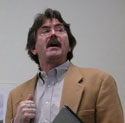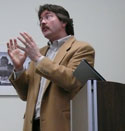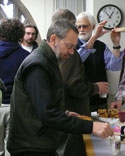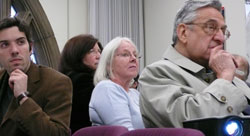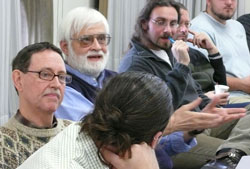
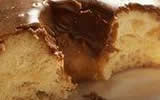
![]()
::: postdoc fellowships
::: senior fellowships
::: resident fellowships
::: associateships
![]()
being here
::: visiting
::: the last donut
::: photo album
::: center home >> being here >> last donut? >> 19 January 2007 |
Friday, 19 January 2007 Where do new ideas come from? That is a question of ever-present importance in our Center. For scholars come here to make their discoveries. Anyone who has struggled to discover will know that new ideas do not suddenly spring fully formed like Athena from the brow of Zeus. The process is more organic. It starts with little seedlings: a nagging feeling that this or that doesn't sound right, that something has been overlooked, that something deserves attention. They are watered by constant thought and attention. Most die. They never had the spark of life. Very few grow to maturity. They are enough. Brad Wilson, a Visiting Fellow this term and our speaker in today's lunchtime talk, had been gardening diligently in his office for two weeks since his arrival, in preparation for this talk. As his talk unfolded, the process was in clear sight. In recent years, philosophers of science have sought to redress their long-standing neglect of experiment. That new literature, however, had done what happens so often in philosophy of science. It took physics as the paradigm science and tuned its theses to it. Why should we expect, Brad wondered, that these results should carry over to biology? There was his seedling. The topic was "hot." We had circulated a quite brief abstract. It was enough to pack the room. After Brad had started speaking, I noticed constant motion in the back of the room. A chair was hoisted high in the air to eke out another place to sit. There were chairs lined up in the hall out to the door, all occupied. Brad proceeded. It was his first Powerpoint presentation. His trepidation at the new technology was completely hidden by his eagerness to connect with his audience. He spent most of the talk stepping well past the invisible boundary between lectern and audience. We heard a short survey of older ideas on experiment, mentioning 19th and 20th century heroes, Bernard, Duhem and Nagel. Brad soon identified the idea that I found most interesting. In any experiment, one must eventually find a way to connect what happens in the lab to what is happening outside in nature. His taxonomy of experimental types showed how that task graded from easy to hard. At the easy end, our experiment might just be the analysis of a sample. On the hard end, we may create something in the lab that cannot be found in ordinary nature--a transuranic element with a half life of a blink of an eye. Then Brad turned to look at several real experiments in biology. He gave a detailed recounting of how guppies--little fish in mountain streams--were found to have colorations that varied in intensity inversely with the efficacy of predators. That had been found in the wild; and the experimental biologist Endler had recreated the effect in artificial ponds in his lab in Princeton. How did this differ from physics experiments? Brad had a list. Its strongest idea was that biological systems formed an organic unity. An experimenter could not isolate one thing for test, as Millikan had done by using electric fields to suspend charged oil drops improbably in midair for our leisurely scrutiny. One had to reproduce a biological system in all its wondrous complexity. Brad thanked us for our attention and received his umbrella. There was a crush of people around the rapidly emptying plates of donuts and bagels. Virtually everyone stayed for questions--a mark of the extent of real interest aroused by the talk. I kept a long list of people eager to have their say. The questions were eloquent. "Peter," Brad said, "I just want to point out that in all that you asked no questions!" Some directly challenged Brad's claims. Edouard pointed out that one of Endler's guppy experiments did simplify away the complexity. By eliminating differences of altitude, he could show that the one simple variable, altitude, was not a cause of color variation. Others were helpful recommendations from the 21st century: "Google 'experiment of nature'," Ken Schaffner urged helpfully. Or Jim Lennox wondered why Brad hadn't divided experiments according to their goals. And then I saw that we'd jumped to the other end of time--that is just what Aristotle would recommend. And then our time was up. A few minutes later, I was still trying to absorb the hungry eagerness of Brad's audience in question time. Brad hurried past me in the hall. "They're like vultures!" he exclaimed. He had gone back to the seminar room in search of a last donut and found every crumb already devoured. John D. Norton Bradley Wilson |



